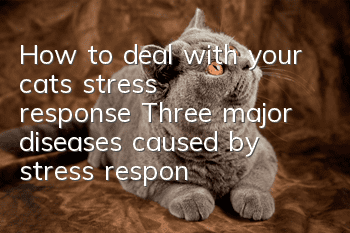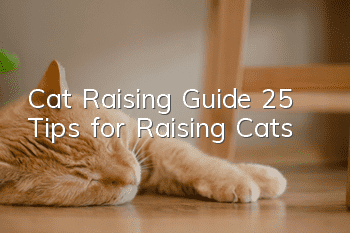How to deal with your cat’s stress response? Three major diseases caused by stress response!

I believe everyone who raises cats knows the stress response, right? What is a stress response? It is a non-specific systemic reaction that occurs when a cat is stimulated by various internal and external environmental factors, which will put the cat in a state of tension. For example, a cat arrives in a strange new environment; another example is that the arrival of a new cat in the home will make the original cat very nervous.
What are the symptoms of a cat’s stress response?
When a cat has a stress reaction, it often causes her mood to change drastically, and can even cause her to lose control of her behavior.
1. Cats have a stress reaction when they arrive in a new environment. They usually look for places to hide themselves and then dive into them.
2. Cats often have hair explosions when seeing strange people or animals.
3. When a cat’s stress response is severe, its pupils will dilate and it will roar. At this time, the cat will engage in aggressive behavior at any time.
Three major diseases caused by stress response
1. Skin diseases:
Yes, you read that right. Cat stress can cause skin diseases. This is why many cats will develop unexplained skin diseases after arriving in a new environment. It may be ringworm or something else.
2. Upper respiratory tract diseases:
When cats are stressed, their immunity will decrease, so upper respiratory tract diseases are also one of the common symptoms.
3. Digestive tract diseases:
This kind of stress not only occurs in environmental changes, but also acute food changes can cause gastrointestinal discomfort in cats, especially purebred cats. Severe stress can also cause some cats to refuse to eat, causing liver function damage.
How to deal with a cat’s stress response?
If cats’ stress reactions are so terrible, does that mean we can’t move, add new members, or take them to pet shops for bathing and foster care?
of course not. In life, in fact, as long as the poop scoopers pay more attention, they can effectively prevent cats’ stress reactions.
1. Avoid suddenly frightening the cat. In daily life, be careful not to frighten the cat artificially. Even if it is fun, don’t do it.
2. Sudden noises, such as broken glasses, car horns, and explosions in movies, can make cats feel uneasy. Parents need to calm their cats’ emotions in time.
3. Enter a new environment and surround it with familiar things. When you notice signs of stress in your catWhen the baby is in danger, try not to move it and reduce the intake of food and water.
4. Do not bathe the cat during a stress reaction, because the cat’s resistance is reduced at this time and it is easy to catch cold and get sick while bathing.
5. After bringing the cat into a new home, try to keep the food consistent with the previous ones. This can reduce gastrointestinal discomfort caused by stress response.
6. If you find an abnormality in your cat and you cannot solve it yourself, be sure to take it to the doctor in time. Do not think that you can rest assured that your cat is healthy. Those hidden dangers often cause more serious harm to cats.
- How to keep your cat warm when your home is cold
- What does the key color of the puppet mean?
- Why do Korat cats need to be neutered?
- What types of cat litter are there? Teach you how to choose cat litter correctly!
- Can a human cold be transmitted to a cat?
- How to cultivate a cat’s sleep schedule? Let it stop parkouring in the middle of the night!
- What should I do if my cat doesn’t like bathing? Does my cat need to be bathed often?
- What does it mean when a neutered male cat has its chick sticking out?
- Is 84 disinfectant harmful to cats?
- Weight and age comparison of Ragdoll cats, how to raise them so that they can reach the weight target



